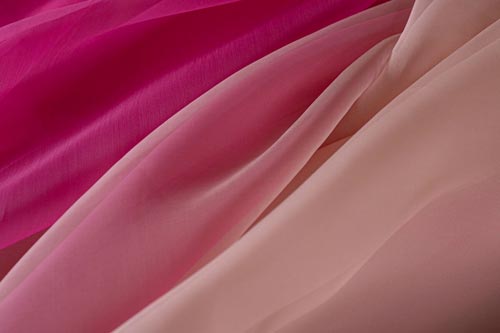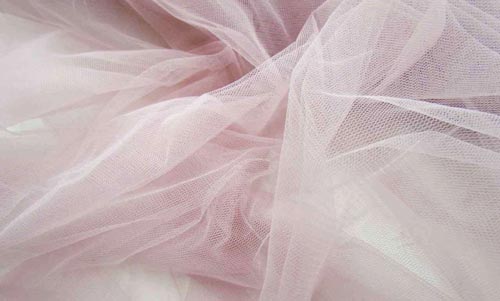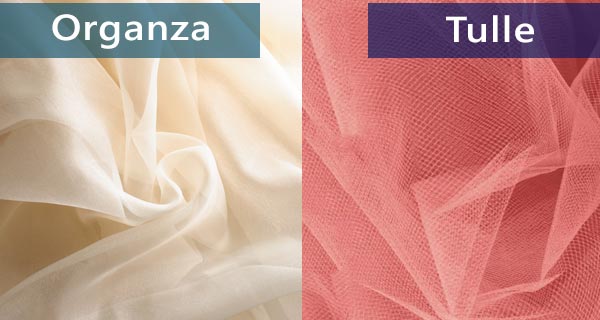Tulle Vs Organza: What is The Key Differences Between Them?
Although there is an abundance of fabrics we can choose from nowadays, very few of them can add layers to a dress while still maintaining sophistication. Two of the most popular choices in this regard are organza and tulle.
Both of them can up your fashion game with a few little tweaks to your dress. Besides, they are the ideal choices for designing the perfect bridal gown for your big day! But if they are so similar, can you just pick either and go with it?
We will answer that question and more by listing and discussing every difference between organza and tulle here.
Table of Contents
Organza & Its Features

Organza is a beautiful fabric whose elegance and subtle shine adds to the overall appeal of a bride on her big day. So it comes as no surprise that organza is often considered to be one of the most popular fabric choices for wedding gowns. Besides, it can be used to design head-turner dresses for other formal occasions.
In the olden days, this thin and sheer fabric used to be made from silk in China, India, France, Italy and other places across Asia, Europe and the middle-east.
However, as time progressed and its popularity crossed boundaries, people found a new way to manufacture it using different synthetic filament fibers like nylon or polyester. Besides, there is a variant of organza called organdy which is made from cotton.
Translucent
The combination of see-through fabrics and laces is a common choice for wedding gowns. It never goes out of style no matter when you decide to tie the knot. But completely transparent fabric may not be the first choice of all to-be brides.
For those who have been looking for a similar option that tones down the transparency a bit, organza can be the new favorite.
It is one of the most ideal diaphanous fabrics you can get your hands on. This translucent fabric highlights your silhouette and natural skin tone without giving it all away. As a result, you can maintain the mystery without compromising the sophistication.
Smooth And Shiny
Who doesn’t want to feel like a queen? Wearing an organza dress will surely make you feel that way because of its rich smooth and shiny texture. Every time you run your hands on the fabric, it will make you feel like royalty! It is one of the many reasons why people choose organza as the ideal material for their evening wear.
Lightweight
Even though you include layers and layers on your customized organza gown, you will not find it too heavy to carry at a party.
This sheer fabric is very lightweight since it has been woven maintaining a very low density. Its weight tends to be only between 20 g/m2 and 50 g/m2. As a result, it can be the perfect material for a high-volume skirt or formal dress!
Limited Flow
Usually, you would expect a lightweight, translucent and smooth fabric like this one to be quite flowy. Having that kind of free movement adds a lot to your overall look since you can play with its volume. Unfortunately, organza doesn’t offer much of such flow. Compared to other similar fabrics, it is a bit stiff.
Prone to Crease
Another common problem with organza is its tendency to form creases. These lines or ridges can easily show up on the dress since the fabric is very delicate.
They can set deeply in the outfit if it is provided through vacuum-packed shipping and improper storage. However, you can solve this problem by ironing or steaming.
Tulle & Its Features

Tulle is another popular choice for bridal events where it can be used for the veil, the decoration or adding flair to the dress. This lightweight fabric has a very fine weave which adds to the delicate presence of a new bride. It can be woven from both natural and artificial fibers including silk, nylon, rayon and polyester.
It has different pronunciations across Europe and America because its origin lies in the French language which treats “u” differently. Besides, its name comes from the French commune called Tulle where the fabric was created for the first time in history.
Ideal For Summer Wedding
Dreaming of a beautiful summer wedding? Remember to keep tulle in your list of wedding necessities since it will provide you comfort from all that heat. After all, nobody wants to be dripping with sweat on one of the most memorable days of their life!
The lightweight structure makes tulle ideal for a wedding taking place in warm weather. You will feel the air everywhere and thus stay cool and calm throughout the event!
Perfect For Draping
Tulle will not only help you to add more volume and playfulness to the dress, but also help with the wedding decoration! It is incredibly flexible which means you can use it to drape any structure including the arch. Additionally, it has elastic properties which increase its draping capabilities even further.
Lots Of Colors
The popularity of tulle in weddings doesn’t mean it is only restricted to different shades of white. It is available in many colors ranging from pastel to vibrant. As a result, you can make your tailored voluminous skirt with colored tulle or invest in a ready-made dress creatively utilizing colorful tulle.
If you are not sure which way you want to go, just check out Pinterest and find out tons of designer-wear prepared with this fabric. Baby pink and pale yellow are the most popular colors when it comes to such tulle outfits.
A Bit Scratchy
Tulle is available in many blends and some of them can be quite scratchy. As a result these blends are usually used on the outskirts of your dress or outfit so that your skin is not constantly in contact with it. You will often find them present in hat trims, ballet tutus and similar outerwear as well.
Tricky Sewing
While the elastic properties of tulle make it a great choice for draping and other creative projects, this feature also makes sewing on it quite tricky. Most fabrics can maintain a steady surface while the sewing machine is working on it. But for special fabrics like tulle, we recommend hand sewing instead to keep it steady.
Organza Vs Tulle- The Differences
Uses
Because of their similar properties, both tulle and organza are often considered for the same projects. They are both very common choices for making veils, being used as an overlay and also creating different kinds of skirts with high volume.
Other than that, tulle is also used to make slips for dresses or skirts, as well as sleeves and other accents.
On the other hand, organza is used to create beautiful trains and lining. Moreover, tulle is more elastic than organza and thus can be used anytime for draping.
Durability
Of course, you would want to have a beautiful dress with delicate details for a long time, especially if it is your wedding gown. In this case, organza wins by a thin margin over tulle since it is more durable. It is much less prone to heat damage and water damage. Thus it will last in your possession for a much longer time.
Ease Of Cleaning
An unfortunate inconvenience you may have to run in quite frequently while using organza outfits is how it needs to be washed by hands.
Because of its delicate structure, it cannot be cleaned through a washing machine. As a result, you may need to confide in a laundry every time you have worn an outfit made by organza.
Stiffness
There is no set measure of stiffness that would be ideal for a dress. So more or less stiffness - both can be beneficial depending on the kind of outfit or decoration you want.
Tulle happens to be much less stiff than organza which means you can use it to create flowy dresses, as well as to drape structures. On the other hand, organza is more well-suited if you want more limited movement in your gown.
Final Word
Clearly, the differences between organza and tulle are not that significant. Both of these sheer fabrics are great choices for formal dresses designed with sophisticated details and graceful flares. Their flaws are also not greater than the other which means you can choose either based on your priorities.
For instance, organza is a bit harder to take care of since it cannot be cleaned with a washing machine. On the other hand, tulle is more prone to heat and water damages. So you can choose either for your big day or an extravagant formal event.
Related post:

